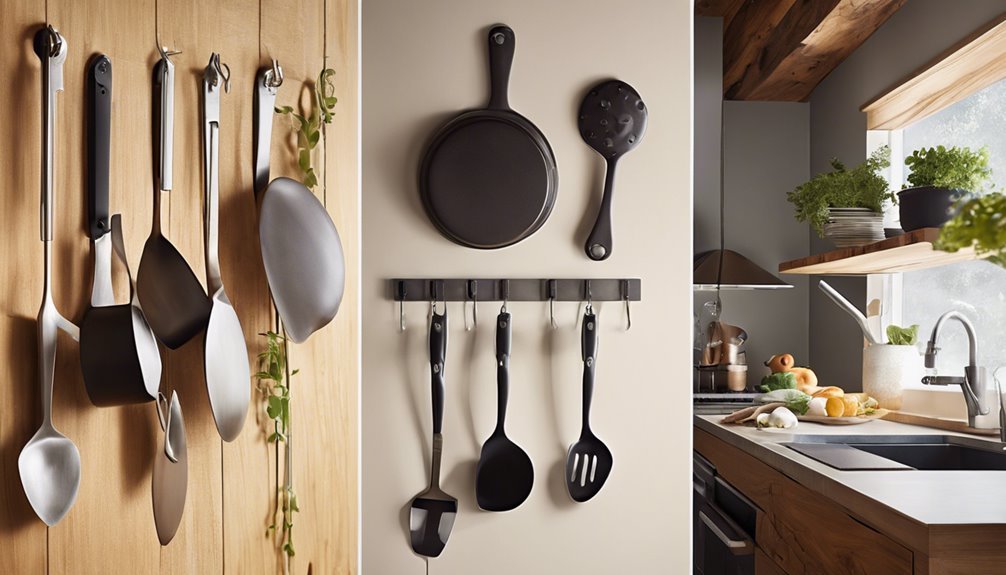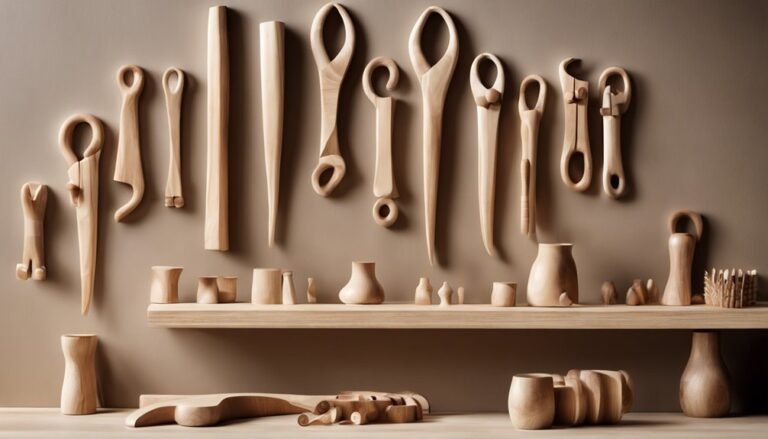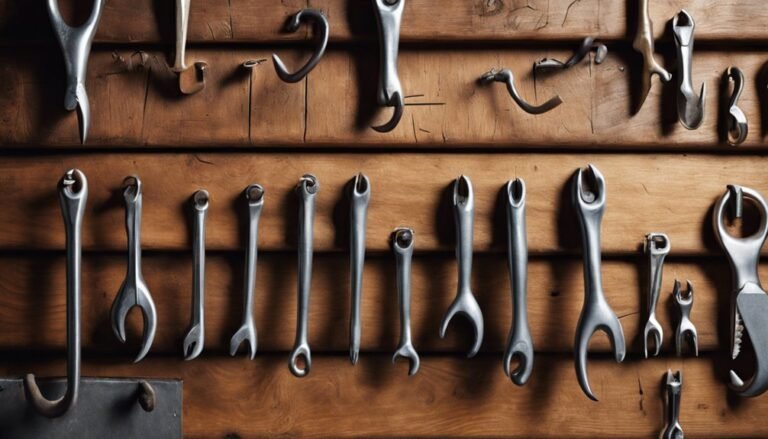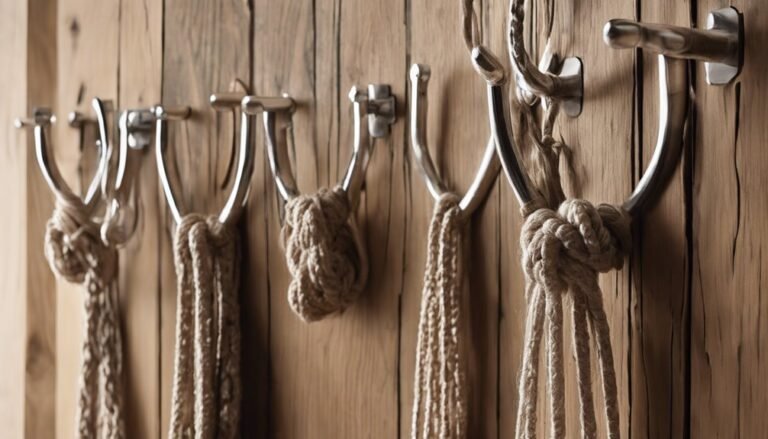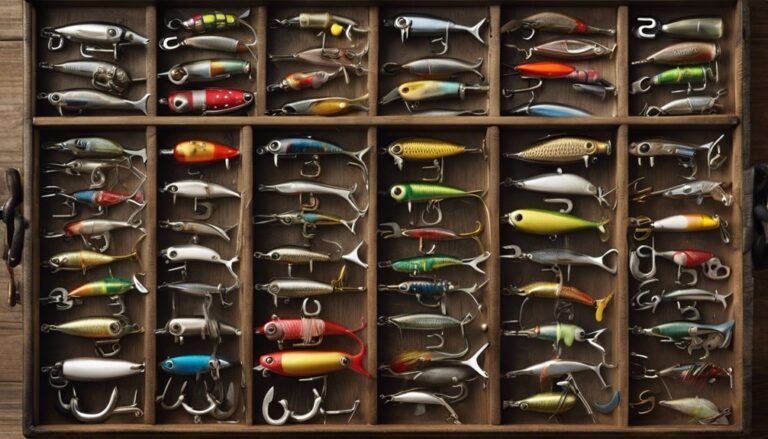Magnetic Hooks vs. Screw-In Hooks
When deciding between magnetic hooks and screw-in hooks, think about your needs. Magnetic hooks are easy to install and reposition on metal surfaces, perfect for quick changes. However, they're not ideal for heavy items or non-metal surfaces. On the other hand, screw-in hooks offer better strength and permanence, suitable for heavier loads and various environments, but require tools for installation. Each type has its pros and cons, so consider your unique requirements to make the best choice. More insights await!
Overview of Magnetic Hooks
Magnetic hooks are a versatile solution for hanging items without the need for tools or permanent installations. These hooks leverage magnetic materials to securely attach to metal surfaces, making them incredibly easy to use. You can find various hook designs, from simple and sleek to more decorative options, allowing you to match your style. Whether you need to hang keys, tools, or decorations, magnetic hooks provide a quick and efficient way to declutter your space. They're perfect for those who crave flexibility, as you can easily move them around or remove them when necessary. With the right magnetic hooks, you can enjoy a more organized environment while maintaining the freedom to rearrange your items as you please.
Advantages of Magnetic Hooks
When you're looking for a simple solution to keep your space organized, magnetic hooks offer several compelling advantages. Their magnetic strength allows them to hold a variety of items securely, giving you peace of mind. Plus, you can easily reposition them without any tools or damage to surfaces, which means you can adapt your organization as your needs change.
- Quick and easy installation: Just stick them on any metal surface.
- Versatile applications: Use them in the kitchen, garage, or office.
- Stylish design: They add a modern touch while keeping things tidy.
With magnetic hooks, you gain flexibility and efficiency, making your space feel more open and organized without the hassle of traditional hooks.
Disadvantages of Magnetic Hooks
While magnetic hooks offer convenience, they do come with some drawbacks that you should consider. One major issue is magnet strength; if the hook isn't strong enough for your needs, it might not hold your items securely. This can lead to frustrating drops or spills. Additionally, surface compatibility is essential; magnetic hooks only work on ferrous surfaces. If you want to use them on wood or drywall, you're out of luck. Even when they do stick, the effectiveness can diminish over time due to dust or debris accumulation. Finally, keep in mind that magnetic hooks may not be suitable for heavy items, limiting your hanging options and potentially compromising your freedom of organization.
Overview of Screw-In Hooks
Screw-in hooks are a versatile and sturdy option for hanging items in various settings. They come in different hook styles, allowing you to choose the best fit for your needs. Whether you're organizing your garage, displaying art, or hanging outdoor lights, these hooks can handle the task.
- Durability: Made from strong screw-in materials, they provide a secure hold.
- Variety: Available in multiple styles, from simple to decorative, to match your aesthetic.
- Ease of Installation: Just screw them into your desired surface, and you're good to go!
With these benefits, screw-in hooks offer freedom and flexibility for your hanging needs, making them a smart choice for any project.
Advantages of Screw-In Hooks
Screw-in hooks offer a high load capacity, making them ideal for hanging heavier items without the worry of them falling. Plus, their permanent installation means you won't have to constantly adjust or replace them. If you're looking for a reliable and sturdy solution, screw-in hooks are definitely worth considering.
High Load Capacity
When you need to hang heavy items securely, opting for screw-in hooks can make a significant difference. Unlike magnetic hooks, which rely on magnetic strength, screw-in hooks provide a robust high load capacity, ensuring your items stay in place without risk of falling. This feature is ideal for those craving reliability in their hanging solutions.
- They can support heavier weights without bending or breaking.
- Installation is straightforward, giving you more freedom to customize your space.
- They're versatile, suitable for both indoor and outdoor use.
With screw-in hooks, you won't have to worry about the limitations of magnetic hooks anymore. Enjoy the peace of mind that comes with knowing your belongings are safely secured!
Permanent Installation Solution
While many hanging solutions offer temporary fixes, screw-in hooks provide a permanent installation that can enhance the functionality of your space. With their sturdy design, these hooks act as permanent fixtures, ensuring your items stay securely in place. You won't have to worry about them slipping or falling, giving you peace of mind. Installation permanence means you can confidently hang heavier items, knowing they're supported by a reliable anchor. Plus, screw-in hooks blend seamlessly with various decor styles, adding both practicality and aesthetic appeal. Whether you're organizing tools in a garage or displaying art in your home, these hooks give you the freedom to create a well-organized environment that fits your lifestyle without the hassle of constant adjustments.
Disadvantages of Screw-In Hooks
While screw-in hooks offer stability, they come with a few drawbacks you should consider. First, installing them can be a bit complex, especially if you're not handy. Plus, they can damage surfaces and have weight limitations that might not suit your needs.
Installation Complexity
Although screw-in hooks can offer a sturdy solution for hanging items, their installation complexity can be a significant drawback. Many users find themselves frustrated with the various installation methods required to properly secure these hooks. Unlike magnetic hooks, which simply stick to metal surfaces, screw-in hooks demand more effort and precision.
Here are a few challenges you might face:
- Tools Required: You'll need a drill or screwdriver, which not everyone has handy.
- Skill Level: Installing these hooks often requires a bit of DIY skill, which can deter some users.
- Time Consuming: It can take longer to install multiple screw-in hooks compared to the quick application of magnetic options.
For those who prioritize ease, user preferences may lean towards magnetic alternatives.
Surface Damage Risk
When considering screw-in hooks, you should be aware of the potential for surface damage. Unlike magnetic hooks, which simply attach without altering your surfaces, screw-in hooks require you to drill into your walls or ceilings. This can leave unsightly holes or scratches, especially if you change your mind about their placement. To mitigate this risk, you might explore surface protection methods, like using wall anchors that minimize damage or even adhesive solutions for lighter items. Damage prevention techniques, such as pre-drilling pilot holes and applying painter's tape, can also help preserve your surfaces. Ultimately, while screw-in hooks offer certain advantages, weighing these against the risk of damage is essential for maintaining your space's integrity.
Weight Limitations Issues
If you're relying on screw-in hooks for heavier items, you might encounter some weight limitations that can be frustrating. Unlike magnetic hooks, which often offer impressive holding power, screw-in hooks can struggle with heavy loads due to their weight capacity comparison. The material strength of the hook also plays a critical role, as weaker materials can lead to failure under pressure.
Consider these factors when using screw-in hooks:
- Load weight: Always check the specified weight limit.
- Installation: Verify hooks are properly anchored to support the weight.
- Material quality: Higher-quality materials provide better strength.
In the quest for freedom in organizing your space, understanding these limitations can prevent headaches and enhance your overall experience.
Choosing the Right Hook for Your Needs
How do you decide between magnetic hooks and screw-in hooks for your specific needs? First, consider the installation surfaces you'll be using. Magnetic hooks work wonders on metal surfaces, offering flexibility and easy repositioning. If you're dealing with drywall or wood, screw-in hooks might be your best bet, providing a more permanent solution. Next, think about the hook materials; magnets can be limited in weight capacity, while metal screw-in hooks typically support heavier loads. Also, reflect on the environment—if you need to frequently change your setup, magnetic hooks allow for that freedom. In contrast, if you want something sturdy and lasting, screw-in hooks are the way to go. Your choice hinges on the balance of convenience and strength!

